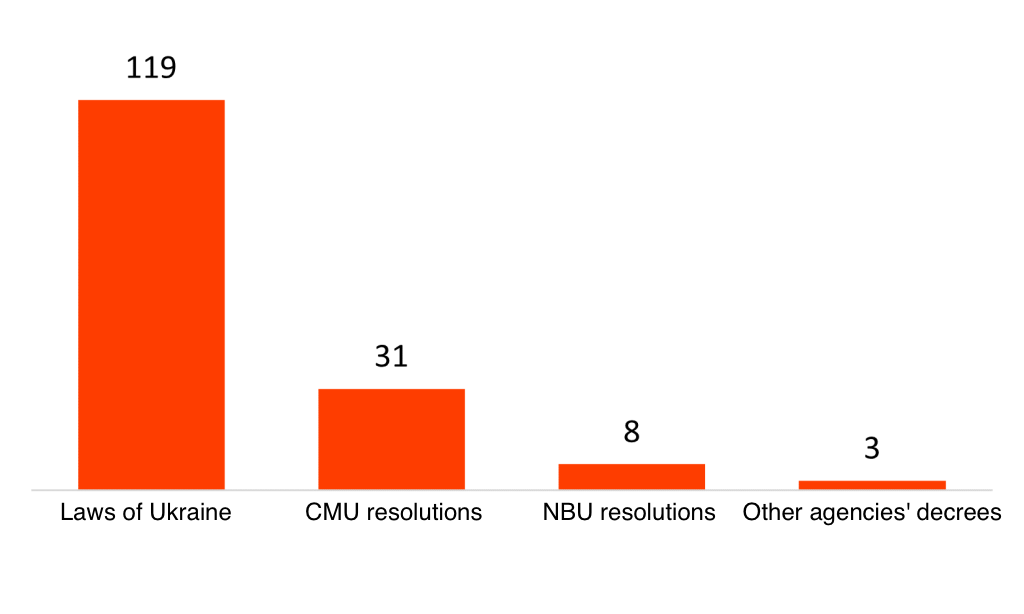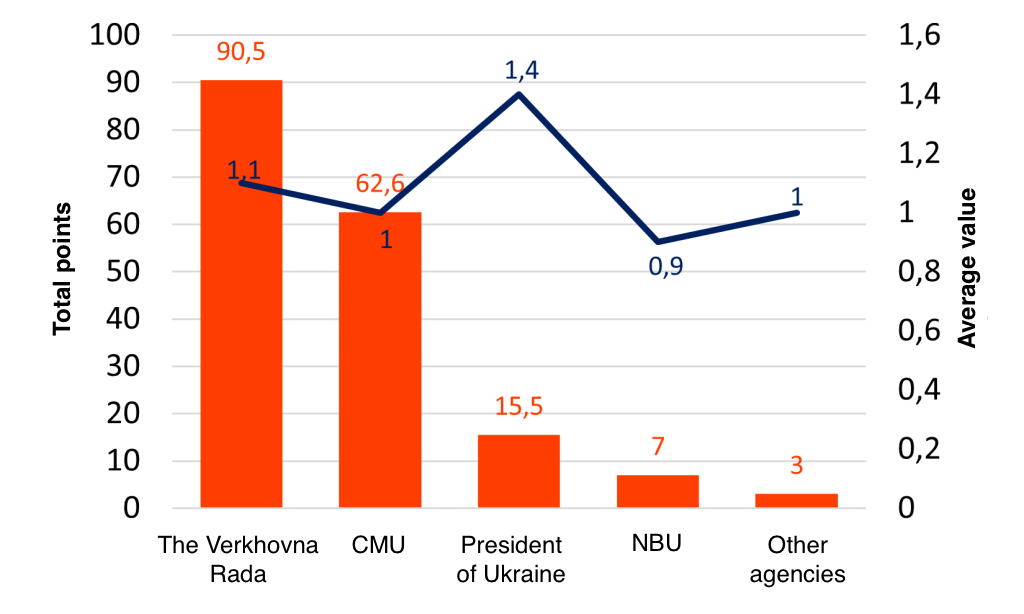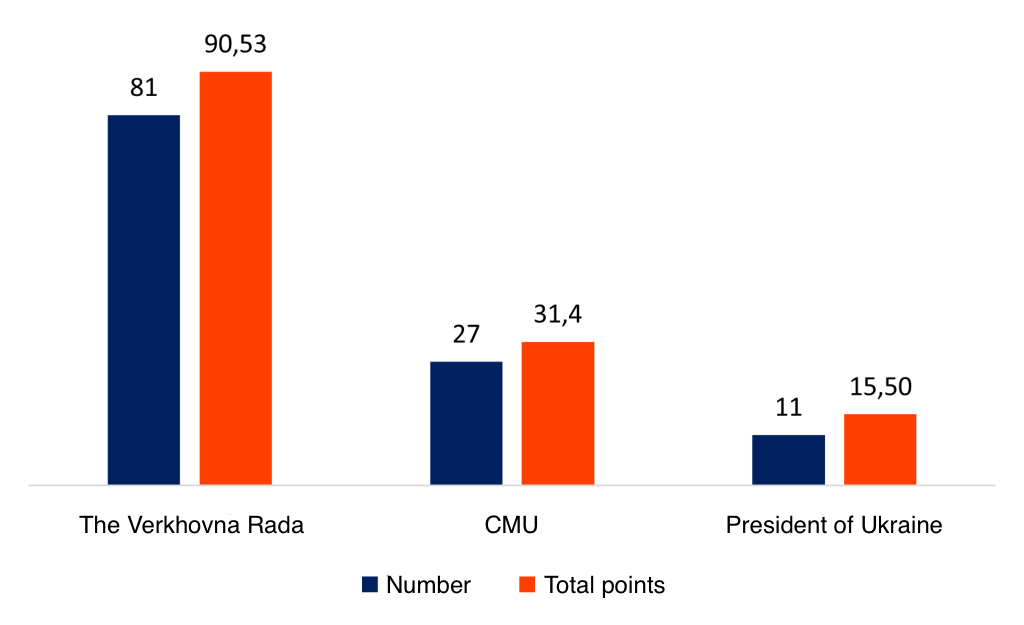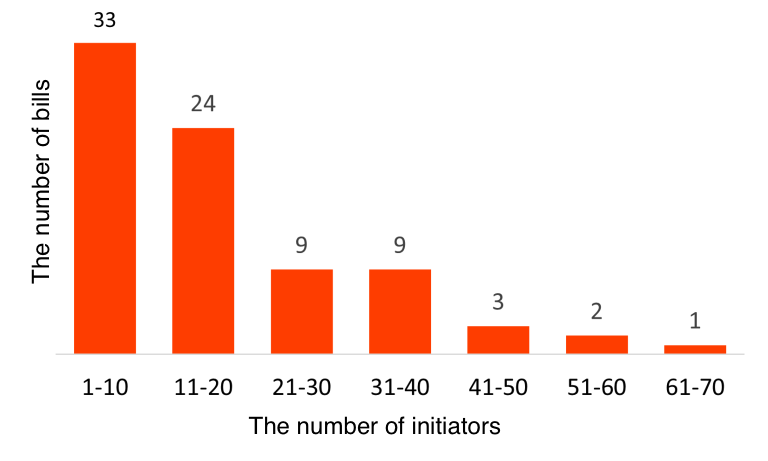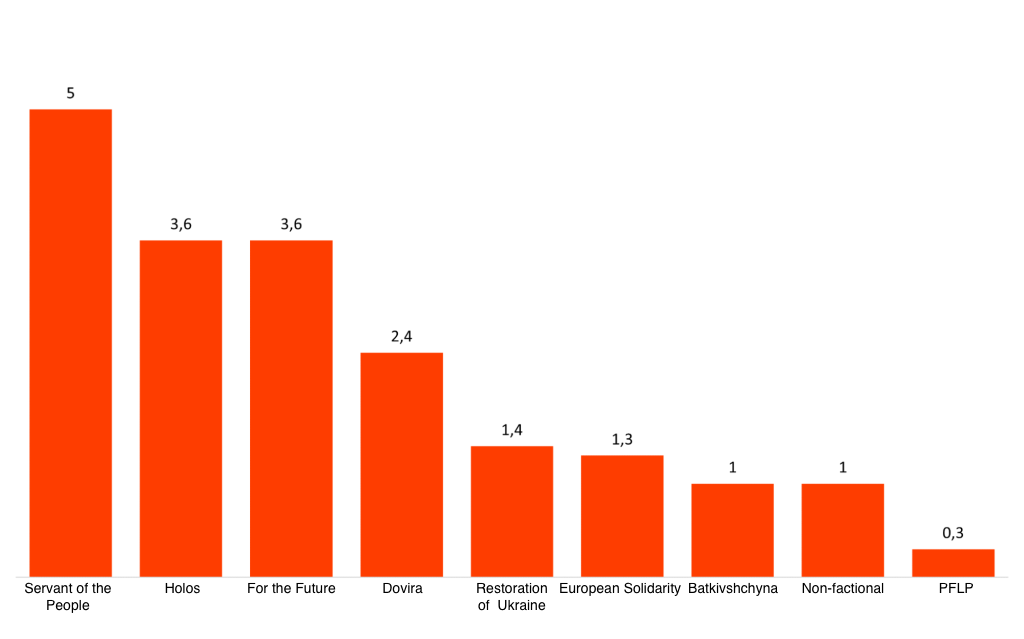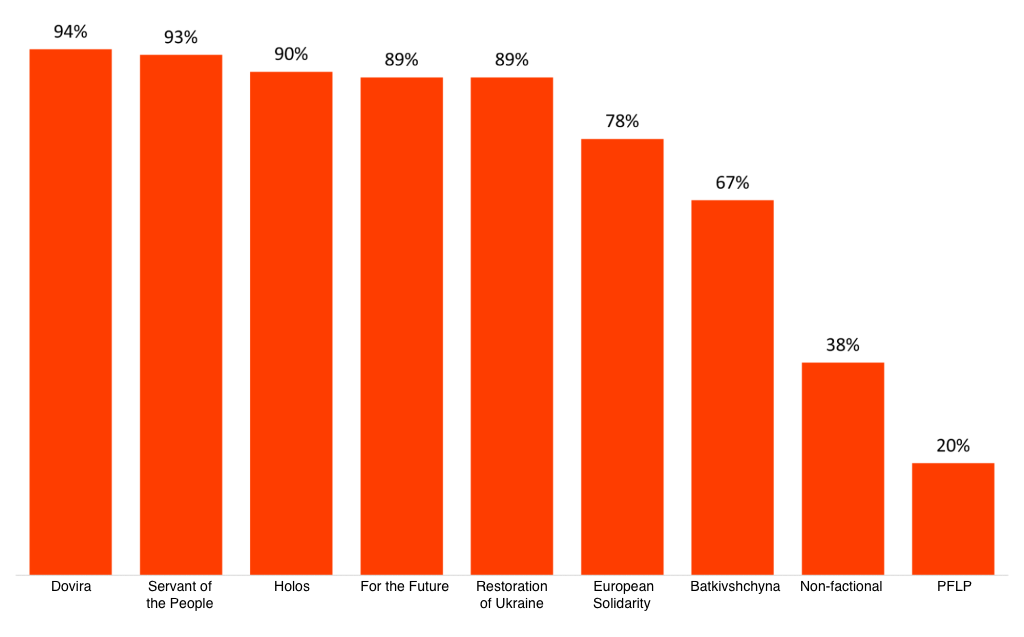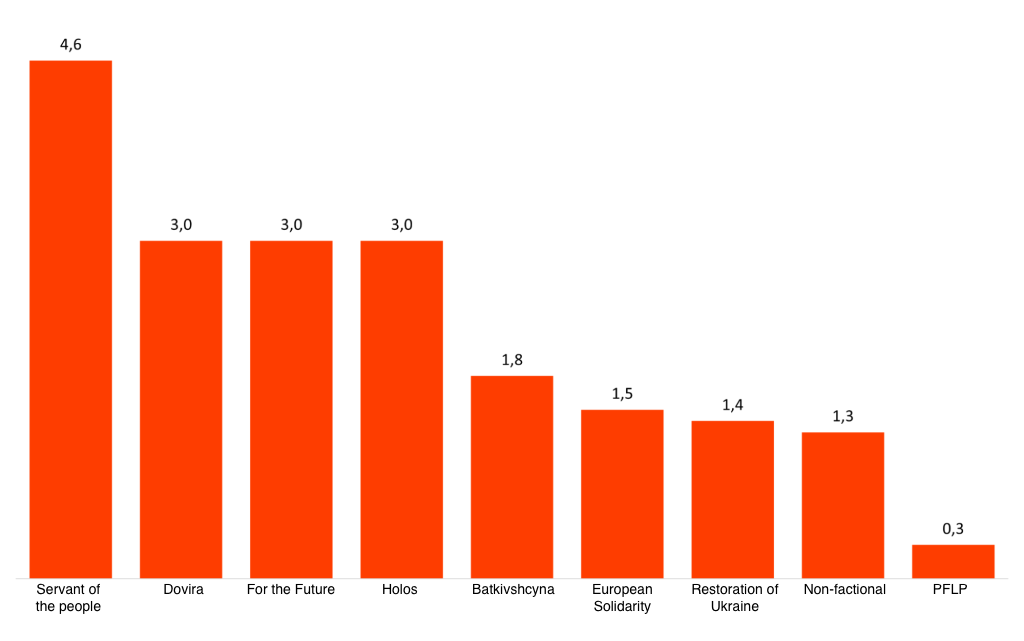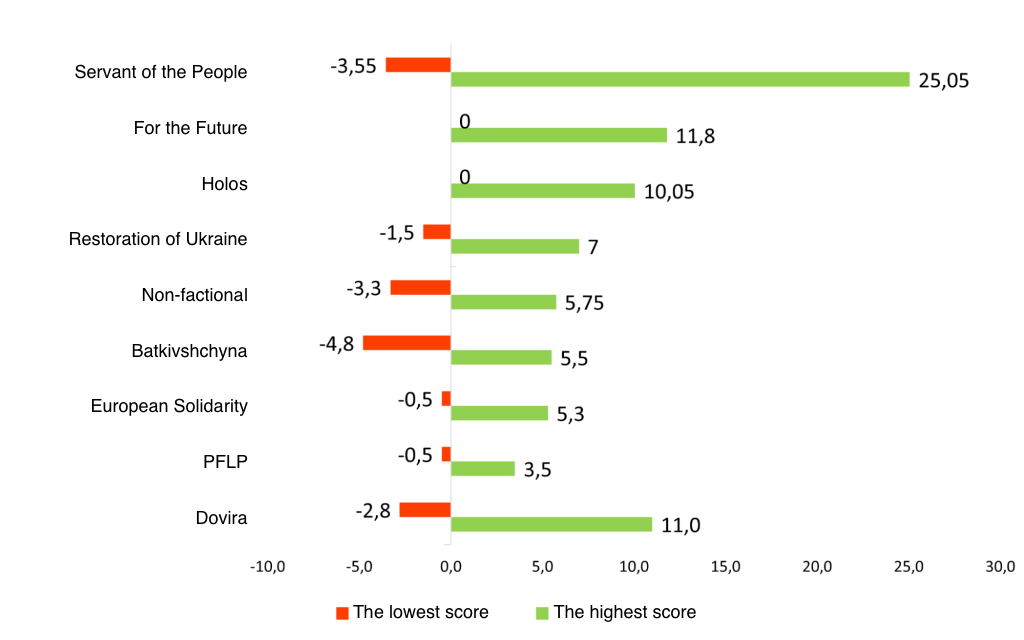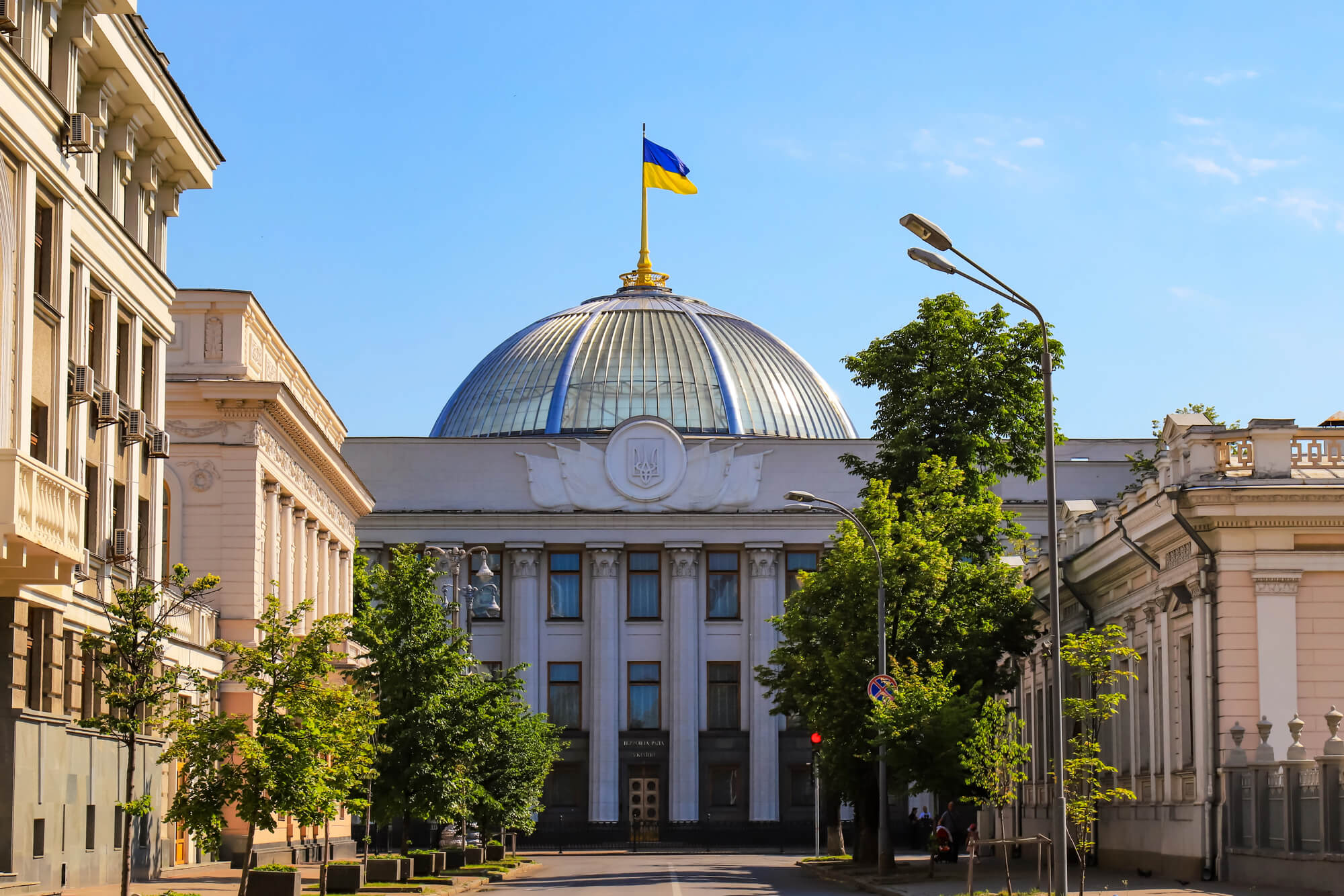Key findings:
- Of the 164 important regulations Reform Index experts believe can change the “rules of the game” in the country, 119 are laws. Of these, 81 were initiated by MPs, 27 by the Cabinet of Ministers (CMU), and 11 by the President. If we were to compare CMU’s proactivity with that of individual deputies, it would place first and the President 11th.
- In 2022, 342 out of the 415 MPs of the ninth convocation came up with at least one bill included in the Index as reform or anti-reform. They occupied 116 ranking positions (sometimes, the deputies received the same number of points ending up in the same place).
- Among the people’s elected representatives, Pavlo Frolov from Servant of the People was the greatest reformer scoring the highest for the laws he proposed. Valerii Zub and Andrii Klochko also ended up in the top three. Four women and eight men were among the top 12 lawmakers scoring 15 points and above. All of them represented the Servant of the People party. Such efficiency of the ruling party is unsurprising since it is much easier for mono-majorities to get their bills passed than for opposition parties.
- The largest share of active lawmakers (over 90%) came from the Dovira, Servant of the People, and Holos factions. The Holos and Dovira deputies often initiated draft laws together with Servant of the People MPs. The Platform for Life and Peace parliamentary group created by former OPFL members proposed the least number of reforms.
- For the second year in a row, women were more effective than men in initiating reforms: 92% of female MPs co-designed laws included in the Reform Index, with the share of men being 70%. Women’s average score in the rankings is also higher than men’s: 5.4 versus 4.1.
- In 2022, the number of anti-reform MPs grew (with an overall negative assessment). There were only seven of them in 2021, but 26 in 2022. They represent all factions except Holos and For the Future. Some “faces of the parties” turned out to be anti-reformers. These were Yuliia Tymoshenko, the leader of Batkivshchyna and her party colleague Serhii Taruta; a former OPFL member Yurii Boiko; the head of the Servant of the People faction Davyd Arakhamia; and the former Minister of Economy from the European Solidarity party, Stepan Kubiv.
The government’s results in 2022
In 2022, Reform Index experts identified 164 regulations significantly impacting the “rules of the game” in Ukraine. These include 119 laws of Ukraine, 31 Cabinet of Ministers resolutions, eight National Bank of Ukraine resolutions, and three decrees by other agencies. Three more documents included in the Reform Index were international agreements. These were the agreement between Ukraine and the EU on road freight transportation, the European Network of Transmission System Operators’ (ENTSO-E) decision to synchronize the Ukrainian power system with the European network, and the free trade zone agreement between Ukraine and Turkey. Since international entities initiated them, they were left out of the rankings.
Figure 1. Reform documents by type and number
Data source: author’s calculations based on the Reform Index from 01/01/2022 to 12/31/2022. NB. We removed three international agreements from our analysis because it is difficult to clearly identify their initiators
Figure 2. Assessment of Reform Index regulations by subject
Data source: author’s calculations based on the Reform Index from 01/01/2022 to 12/31/2022. We removed three international agreements from our analysis because it is difficult to clearly identify their initiators.
Lawmaker rankings
Laws usually introduce the most extensive changes in the country. Therefore, we analyzed who designed and submitted the largest number of reform bills to the Verkhovna Rada.
Who authored the bills?
Sometimes the actual authors of draft laws remain “in the shadows:” for example, the Ministries or the NBU submit their bills through MPs or the President. However, it is almost impossible to determine the “real” initiators of legislative acts from open sources. Therefore, this study relies on the initiators as formally indicated in the bills’ cards.
Even though bills’ cards list many initiators, according to the regulations, the first listed MP is credited as the author. There may be several reasons for the large number of initiators indicated in the bill’s card:
- One or more Verkhovna Rada committees designed the law, meaning the bill’s initiators constituted a significant part of the committee(s).
- Besides, MPs can, on their own initiative, join in with developing draft laws in which they see benefits for themselves to improve their political positions.
- The law’s author was an opposition MP who involved MPs from the pro-government party in its drafting to increase the likelihood of adopting the document. However, this does not mean that the opposition MPs cannot single-handedly initiate essential draft laws and get them passed. Last year, two bills that made it to the Reform Index were exclusively designed by MPs from opposition factions. These were the law exempting charitable aid from taxation (initiated by Petro Poroshenko and Maksym Savrasov from European Solidarity) and the law on merging the Pension Fund and the Social Insurance Fund, solely initiated by Mykhailo Papiev from the PFLP deputy group).
We also tested the hypothesis regarding possible MP rankings advantages of the heads of Verkhovna Rada committees. It is often beneficial for the bills’ authors to list such people’s deputies among the initiators to increase the chances of the drafted document being adopted. Indeed, two committee heads finished in the top 12 of the rankings. We are talking about Andrii Klochko (SoP, third place in the MP rankings), heading the Committee on the Organization of State Power, Local Self-Government, Regional Development and Urban Planning, and Oleh Bondarenko (also SoP, sixth place in the MP rankings) chairing the Committee on Environmental Policy and Nature Management. Everyone else received different points for working on draft laws or for inaction last year, occupying various positions in the rankings. For example, Mykola Poturaiev chairing the Committee on Humanitarian and Information Policy placed 20th, and Anastasiia Radina chairing the Committee on Anti-Corruption Policy, ended up 97th. The chairman of the Committee on Budget, Yurii Aristov, did not make it into this year’s rankings. At the same time, the two committee heads, Dmytro Natalukha (economic development) and Oleksandr Zavitnevich (national security, defense, and intelligence), received negative evaluations. (This paragraph was added on March 2, 2022.)
From January 1 to December 31, 2022, lawmakers initiated the most change-making bills proposing 81 such laws. Seventy-six of them received positive evaluations from experts, one received zero points, and four more turned out to be anti-reform. These were laws introducing tax and customs benefits for industrial parks, localization in the machine-building industry, and changes to the law on medicinal products restricting the import of medicines from Russia and Belarus.
Figure 3. Reform bills by the legislative initiative entity
Data source: author’s calculations based on the Reform Index from January 1, 2022, to December 31, 2022
Since MPs initiated the largest number of change-making laws, we became interested in knowing who made the most effort to reform the country. Therefore, we compiled the people’s elected reformer rankings. For this, we used Reform Index project data, under which our experts single out the adopted regulations they think will affect the country’s economic and social life positively or negatively, using values ranging from +5 (significant reform) to -5 (significant anti-reform). It should be noted that in compiling the rankings, we only use the laws assessed by Reform Index experts. For each initiated bill, deputies receive the number of points that Reform Index experts assign to the bill after its adoption. Thus, MPs who proposed one law worth 3 points would occupy the same place in the rankings as those who initiated three laws worth 1 point each. This data makes it possible to determine which factions have the most pro-reform deputies, whether there are more male or female reformers, etc. (This paragraph was updated on March 2, 2022)
The exit of OPFL and the staff replacement in the government: how Parliament’s composition changed in 2022
Parliament’s composition changes began after Russia’s full-scale war against Ukraine. They mainly concerned MPs of the pro-russian Opposition Platform – For Life faction.
On March 15, 2022, it became known that Ihor Abramovych, Tetiana Plachkova, Vadym Stolar, and Oleksandr Feldman had left the faction. On the same day, the scandalous MP Ilia Kyva laid down his mandate (a former OPFL member put on the international wanted list by the State Bureau of Investigation for anti-Ukrainian activities and justifying the russian invasion of Ukraine shortly before the war).
Five days later, the National Security and Defense Council (NSDC) issued a decision suspending (actually prohibiting) the activities of eleven parties professing anti-Ukrainian positions, including OPFL, under martial law. A few days later, Valerii Hnatenko, Ihor Kisiliov, Oleksandr Lukashev, Volodymyr Moroz, and Nataliia Prykhodko announced their intention to leave the faction.
Nearly a month later, on April 21, twenty-five former OPFL members formed a new deputy group (Platform for Life and Peace, PFLP), with seventeen more ex-colleagues establishing the Restoration of Ukraine parliamentary group in May. The PLFL faction officially ceased to exist in the same month.
Despite banning the OPFL party, most faction members of the same name (there were 42 of them before the start of the full-scale war) continue to be MPs and even hold leadership positions in the committees. Overall, according to 2022 data on the website of the Verkhovna Rada, only three members of this faction laid down their mandates: Kyva, whom we mentioned earlier, Yuliia Liovochkina, and Vadym Rabinovych, who was stripped of his mandate due to losing citizenship. (This paragraph was updated on March 2, 2022.)
In addition, on November 3, Servant of the People MP Ihor Vasylkovskyi lost his mandate due to losing Ukrainian citizenship. Non-factional MP Dmytro Shentsev put down his mandate due to difficult family circumstances. Non-factional MP Vadym Novynskyi also laid down his mandate in July. (This sentence was modified on March 2)
Five more MPs laid down their mandates prematurely because of being appointed to new positions. Ex-Holos MP Rustem Umerov became the new head of the State Property Fund of Ukraine in September. Former Servant of the People deputy Olha Sovhyria became a judge of the Constitutional Court of Ukraine in August. Her colleague from the faction, Andrii Kostin, was appointed the general prosecutor, and another MP from the faction, Mykola Solskyi, headed the Ministry of Agrarian Policy and Food. In July, For the Future MP Dmytro Lubinets became the Ukrainian Parliament Commissioner for Human Rights.
As of the end of 2022, there were 415 MPs of the ninth convocation.
They finished the year with the following results: 310 received positive assessments in the rankings: from 0.5 to 25.05 points. Twenty-six deputies received negative reviews: from -0.05 points to -4.8 points. Six MPs participated in designing laws included in the Reform Index but received an overall score of 0. Another 73 MPs did not initiate reform laws during the year and were not included in our rankings.
Therefore, 342 MPs remained in the rankings in 2022, occupying 116 places (for some deputies, the overall points assigned for initiating the laws coincided).
Figure 4. Distribution of the scores of MPs initiating at least one (anti)reform
Assessment criteria for MPs
Although this article evaluates only the MPs’ participation in designing and submitting reform bills, we understand that it is not the only indicator of the effectiveness of the work of individual deputies. Thus, Article 24 of the Constitution of Ukraine provides an exhaustive list of the MPs’ duties: personally participate in meetings of the Verkhovna Rada and its bodies; personally receive citizens; study the voters’ needs and requests; inform the voters about their parliamentary activities; represent the interests of their faction in committees and commissions of which the MP is a member, etc.
In addition, since the beginning of the full-scale war, MPs have engaged in volunteering or joined the territorial defense forces. Two people’s elected officials (Roman Kostenko and Roman Lozynskyi from Holos) are fighting on the front line. Servant of the People MP Sviatoslav Yurash was also mobilized into the Armed Forces. (This paragraph was modified on March 2 after the article’s publication.)
An accurate and comprehensive evaluation of the effectiveness of each MP during wartime is also hindered by limited access to Verkhovna Rada data.
Collective work
In 2022, 342 MPs initiated at least one law included in the Reform Index with a positive or negative assessment. MP groups from different factions drafted 77 of the 81 reform laws, and only four regulations had one initiator. These were the laws on merging the Pension Fund with the Social Insurance Fund (initiated by Mykhailo Papiev, PFLP), on bilateral contracts on the electricity market (by Yurii Kamelchuk, SoP), on protecting state information resources (by Oleksandr Fedienko, SoP), and on implementing technical regulations in agro-industrial complex and mechanical engineering for this industry (by Artem Chornomorov, SoP).
Figure 5. Bills included in the Reform Index by the number of initiators
MPs most frequently submitted draft laws in small groups of up to 21 co-authors. Sometimes, much more people’s elected officials participated in designing them. In particular, four draft laws had the most co-authors in 2022: on stimulating Ukrainian book publishing and distribution (64 initiators), on copyright and related rights (59 initiators), on women’s voluntary military registration (56 initiators), and on developing local and voluntary fire protection network in communities (48 initiators).
Top 12 changemakers
Twelve MPs received the highest scores of 15 and above. All of them belong to the Servant of the People mono-majority faction. It is unsurprising since it is much easier for deputies from the largest parliamentary faction to get their bills passed than for representatives of other parties. Interestingly, MPs whose names were little known to the general public reached the top of the rankings. However, it is much easier to find familiar names among the top anti-reformers since these people’s representatives used to frequent Ukrainian TV channels’ live broadcasts.
As noted above, the high-ranking scores merely indicate the MPs’ active participation in initiating important laws that contribute to the progress of reforms in Ukraine. However, even a high score in the rankings does not guarantee deputies’ flawless work in the Verkhovna Rada. Some of the parliamentarians in high positions in the rankings may have a controversial reputation regarding other aspects of their activities or may even be embroiled in corruption scandals (this paragraph was added on March 2, 2022).
Top 12 reformers
The full MP rankings are available at the link
Top 10 anti-reformers
The full MP rankings are available at the link
The faction heads and so-called public faces, i.e., MPs who appeared most often in the media in 2022, landed in the middle of the rankings. However, three faction heads (Davyd Arakhamia of Servant of the People, Yuliia Tymoshenko of Batkivshchyna, and Yurii Boiko of PFLP turned out to be anti-reform at the year’s end.
The 2021 rankings leader Danylo Hetmantsev of Servant of the People fell to the 23rd position in 2022, scoring 11 for fourteen draft laws. Halyna Tretyakova also received a high score and eighth place in 2021 but ranked 27th in 2022, with a score of 10.3 for working on nine draft laws. MP Maryana Bezuhla, who often found herself in the epicenter of media attention in 2022, received 9.2 points for twelve draft laws, which secured her 32nd place in the rankings.
The head of the European Solidarity faction, Petro Poroshenko, placed 97th thanks to working on one draft law, which earned him 1 point. MP Nina Yuzhanina shared the 97th place with the faction head thanks to one initiated law. One of the highest ratings within Eurosolidarity (5 points) was given to MP Volodymyr Viatrovych for proposing four essential bills, which secured him 65th place in the overall rankings.
The head of the Holos party placed 79th. She received 3.25 points for initiating three bills. One of the party’s most media-face MP, Yaroslav Zhelezniak, ranked 35th with 8.75 points for seven initiated bills.
Which faction has the most reform initiators?
Figure 7. Average score by faction
Figure 8. Percentage of proactive MPs by faction
Figure 9. Number of draft laws per MP in the faction
Figure 10. The highest and lowest scores in the faction
Dovira: 94% of proactive MPs
In late 2022, the Dovira faction had 18 parliamentarians, of which thirteen received positive assessments. The highest place in the rankings (23rd) was taken by Larysa Bilozir, who received 11 points for co-designing eight important bills.
MP Borys Prykhodko became the faction’s biggest anti-reformer getting -2.5 points. Although this MP’s track record includes draft laws with a positive assessment, he co-designed three anti-reform regulations, leaving him with a negative result (tax and customs benefits bills and localization in the machine-building industry). MPs Serhii Kulinich and Vladyslav Poliak also received a negative score of -1.5 points for working on the draft law on localization in the machine-building industry. Because of this, the faction has the highest percentage of anti-reformers: 18%.
Dovira MPs participated in submitting 30 out of the 81 “MP” laws included in the Reform Index. Next, we will look at the initiators of the reform laws by faction.
Servant of the People: 92% of proactive MPs
The faction’s 195 MPs received positive scores, of which the highest score of 25.05 and first place in the overall rankings went to MP Pavlo Frolov.
At the same time, the faction has the highest number of anti-reformers in absolute terms (twelve). MP Ihor Marchuk, who participated in designing four draft laws, received the lowest rating of 3.55 because three of them were rated negatively by Reform Index experts. According to last year’s results, the faction head Davyd Arahamia also became an anti-reformer receiving -1.5 points for working on the bill on localization in machine-building. MPs Dmytro Natalukha (-0.05 points); Roman Kaptielov, Roman Babii, and Lyudmila Marchenko (-1.5 points each); Anna Purtova (-1.3 points); Oleksandr Zavitnevich and Denys Maslov (-1.8 points each); Oleksiy Zhmerenetskyi (-2.05 points); Dmytro Mykysha (-2.3 points); and Oleksiy Movchan (-2.8 points) also joined the anti-reformer ranks.
Holos: 90% of proactive MPs
The Holos faction has 19 MPs, of which 17 received positive scores, and two did not take part in designing change-making laws. Yaroslav Yurchyshyn received the highest score in the faction for co-developing eight reforms with a total score of 10.05 (35th place in the overall rankings). Three MPs “earned” the lowest but positive score of 1 point: Roman Kostenko for working on the law introducing electronic ID cards for veterans, and Oleh Makarov and Andrii Osadchuk for participating in designing the law on stimulating Ukrainian book publishing.
In 2022, Holos became one of the two factions without anti-reformers. Overall, this faction’s MPs participated in submitting 28 out of the 81 “MP” laws included in the Reform Index.
For the Future: 89% of proactive MPs
The For the Future faction consists of 18 MPs, 16 of whom received positive points. Two more (Stepan Ivakhiv and Viktor Mialik) did not participate in designing change-making bills, so they did not make it into the rankings. Last year, For the Future became the second faction after Holos, in which no one MP received a negative assessment.
Yaroslav Dubnevich received the highest rating of 11.8 points for working on eight reform bills, which earned him 19th place in the overall MP rankings. Four deputies received the lowest score of one point: Oleksandr Hereha, Ihor Huz, Serhii Rudyk, and Yurii Shapovalov.
Overall, the faction’s MPs co-designed 32 reforms related to business regulation, culture, social sphere, and agriculture.
European Solidarity: 78% of proactive MPs
The European Solidarity faction had 27 MPs at the end of 2022. Mykhailo Bondar received the highest rating of 5.3 points in the faction for working on five draft laws included in the Reform Index, which secured him 62nd place in the MP rankings.
The faction had three anti-reformers, each getting -0.5 points for co-initiating the law on localization in machine-building: Iryna Herashchenko, Mariia Ionova, and Stepan Kubiv.
Overall, the European Solidarity MPs co-worked on the smallest number of reform bills (17).
Batkivshchyna: 67% of proactive MPs
The faction comprises 24 MPs, 12 of whom received positive assessments. Valery Dubil, who co-designed four reform bills, got the highest score and placed 61st in the faction rankings.
Four MPs ended up as anti-reformers. Serhii Taruta received the lowest score of -4.8. All draft laws he co-designed received unfavorable evaluations from the Reform Index experts. The faction head, Yuliia Tymoshenko, also became an anti-reformer last year. She joined in with developing one law (on localization in machine-building), which earned her -1.5 points. Two more anti-reform MPs (Andrii Nikolaienko and Aliona Shkrum) took part in designing three anti-reforms. Although they helped develop bills that later received positive reviews, the final evaluations were negative. Shkrum received -0.6 points and Nikolaienko -2.3 points.
Overall, the Batkivshchyna MPs contributed to designing 26 reform laws.
Non-factional: 38% of proactive MPs
At the end of 2022, there were 26 non-factional MPs in Parliament, of which 14 received positive scores and 2 received negative reviews. Therefore, this group of deputies was the least involved in initiating reforms. The highest score of 5.75 and 60th place in the rankings went to Roman Sokha.
There were two anti-reform non-factional MPs. Musa Mahomedov received the lowest score (-3.3) for working on two draft laws on customs and tax benefits for industrial parks. Liudmyla Buimister got -1.5 points for designing the bill on localization in machine building.
Overall, non-factional MPs co-initiated 21 change-making draft laws.
Platform for Life and Peace and Restoration of Ukraine: proactive ex-OPFL MPs
The Restoration of Ukraine deputy group comprises 19 MPs, 17 of whom contributed to designing at least one important law.
The highest score in the faction (7) and 49th place in the overall MP rankings went to the former co-chairman of the group, Ihor Abramovych (who laid down his mandate in early February 2023).
The newly established group had only one anti-reformer, Yevhenii Shevchenko. He received -1.5 points for working on the law on localization in machine building.
Overall, Recovery of Ukraine MPs worked on 12 draft laws included in the Reform Index in 2022.
The situation is entirely different in the PFLP deputy group, which had only 27% of proactive MPs (five deputies out of twenty-five). Only four PFLP members received positive scores, with the highest score (3.5) assigned to Serhii Larin (77th place in the overall MP rankings) for co-developing three bills included in the Reform Index. The faction’s anti-reformer was its head, Yurii Boiko, who co-designed two bills last year: one on national minorities, which received a positive assessment from experts, and a controversial bill on localization in machine building, which received a negative score. So, Boiko’s overall score is -0.5.
Overall, the Restoration of Ukraine MPs participated in designing six draft laws included in the Reform Index.
Are there more female or male reformers?
Our rankings include 76 female MPs who initiated at least one reform during the year out of the 83 women deputies working in Parliament. Therefore, the share of proactive women parliamentarians is 92%. The women MPs’ average score in the rankings is 5.4, and the median is 4.5 points. These indicators are higher than the previous year’s (in 2021, 72 women MPs (89%) entered the rankings, with an average score of 4.8 and a median of 4 points).
The highest positive rating in 2022 was given to Viktoriia Kinzburska, who placed sixth in the overall rankings. Yuliia Tymoshenko and Liudmila Buimister got the fewest points (-1.5). Overall, there were seven anti-reformers among women.
Last year, 260 male MPs initiated at least one reform, i.e., 80% took the initiative. Their mean score was 4.1, and the median score was 3. Like female MPs, male MPs improved their scores in 2022 compared to 2021, when the number of proactive MPs was 237 (70% of the total), with an average score of 2.7 and a median of 1.
Pavlo Frolov topped the overall rankings with the highest positive score, and Serhii Taruta received the lowest score (-4.8). Overall, 19 men became anti-reformers last year.
What the Cabinet of Ministers and the President initiated
The most crucial bills introduced to continue reform and European integration in 2022 were mainly designed in cooperation with the Office of the President or central bodies of executive power. Therefore, they were submitted to the Verkhovna Rada by the President of Ukraine, Volodymyr Zelensky, and the Prime Minister of Ukraine, Denys Shmyhal.
Last year, Denys Shmyhal registered 27 draft laws in the Verkhovna Rada that were adopted and included in the Reform Index. A large part of the bills introduced by the Prime Minister concerned sectoral reforms. The following legislative initiatives of the Cabinet of Ministers received the highest points: on chemical safety and management of chemical products, the new version of the law on official statistics, changes to the Customs Code allowing Ukraine to join the “customs visa-free regime,“ the law on freelancing, the law on administrative procedures, and also on cooperation with the International Criminal Court. The Prime Minister’s total score in 2022 was 31.4 points. Had he participated in the rankings alongside the MPs, he would have placed first by the sum of points.
Ukraine’s President Volodymyr Zelenskyi registered 11 laws last year. They mostly contained a significant European integration component or ratified international documents. These are the laws to enable “customs visa-free travel:” on Ukraine’s accession to the Conventions on common transit and the simplification of formalities in trade in goods with the European Union; ratification of the Istanbul Convention; ratification of the Agreement between Ukraine and the EU on common aviation area; Ukraine’s accession to the European Public Law Organization; and ratification of the protocol on the law applicable to maintenance obligations. The sectoral reforms initiated by Zelensky include the law on the environment and the regulation that facilitates transferring information about ultimate beneficiaries to the Unified Register of Legal Entities and Individuals for entrepreneurs. Volodymyr Zelensky’s total score is 15.5. Had he participated in the overall MP rankings, he would have placed 12th.
Conclusion
The Servant of the People MPs at the top of the rankings should be no surprise since the mono-majority faction has much more leverage to bring the initiated draft laws to adoption. However, compared to last year’s results, this faction boosted the development of reform bills. There were sixty-nine of them in 2021 and seventy-eight in 2022. However, the faction’s average score decreased slightly. In the year before last, it was 5.3 points vs. 5 points in 2022. In addition, the number of anti-reformers among the faction’s MPs increased. Representatives of the opposition factions (European Solidarity and Batkivshchyna) began participating more actively in designing reforms.
A part of the disbanded OPFL faction remained unchanged in their disregard for reforms. Only eight MPs of this banned political force had left the Verkhovna Rada by late February. The rest continue to work in Parliament, despite calls from the public and other MPs to strip them of their mandates.
Attention
The author doesn`t work for, consult to, own shares in or receive funding from any company or organization that would benefit from this article, and have no relevant affiliations
